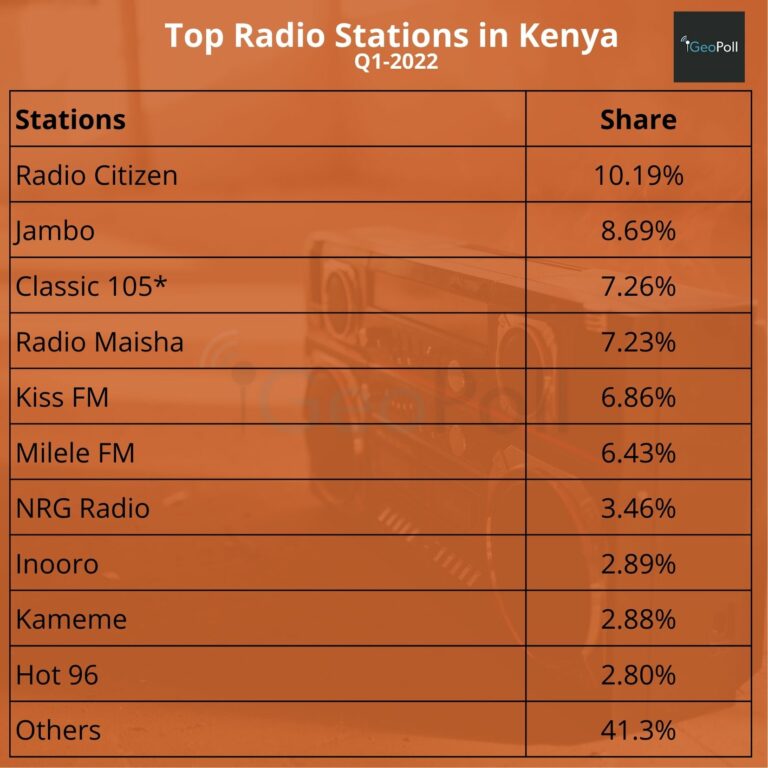Kenya’s media landscape presently comprises a wide variety of print, television, and online platforms. The private sector is largely responsible for the generation and distribution of information, although it is closely supervised by the government.
According to a nationally representative survey done in 2015 by BBC Media Action, almost all of Kenya’s adult population (98%) has access to radio and a mobile phone (97%). Connection to television is also common (81%), and internet connection is available to more than half of the adult population (51%).
Six years later, radio remained the most popular form of media, according to a GeoPoll National Media Establishment Survey of 1,905 respondents, with nearly nine out of every ten respondents in the research having listened to the radio in the preceding 30 days.

The internet has eclipsed television in popularity. Eight out of every ten people have had access to both types of media in the past 30 days. Furthermore, little over half of the studied respondents are print readers.
Access To Media By Gender
For several media, the prevalence of consumption varies by gender. Males had more access to the radio (+6%) than females. This gap was observed again in newspaper readership, with males finding to be +9% greater than females.
Access To Media By Age
While radio listenership was high (over 80%) across all age groups, there was a greater age bias as respondents became older. Individuals aged 25-34 and 35+ were also more likely to watch television than those aged 15-24.
People aged 25 to 34 are more likely to read print media such as newspapers and magazines. As expected, younger age groups (15-24 year-olds and 25-34-year-olds) use the internet more often than those aged 35 and older.
Radio Media In Kenya
According to the Media Council of Kenya’s (MCK) 2021 Status of Media Report, radio was the major source of information in Kenya and the most popular media channel (74%). There are almost 200 licensed radio stations in the nation, all of which are functioning.

Despite a significant concentration of radio stations in urban areas, over 60 private vernacular radio stations broadcasting in many languages have a strong presence in rural Kenya. Among them are nearly 40 community radio stations.
Unfortunately, many of these radio stations are ill-equipped and understaffed, and the majority are owned by or affiliated with politics. Mediamax, which owns Kameme FM and Milele FM, for example, has links to President Uhuru Kenyatta’s family.
The Standard Group, which owns Radio Maisha, Vybes Radio, and Spice FM, has links to the Moi family, while Royal Media Services, which owns 14 radio stations including Radio Citizen, is controlled by Raila Odinga’s close colleague Samuel Kamau Macharia. Joshua Chepkwony, the owner of Kass FM, is alleged to have close relations with Deputy President William Ruto. This raises the crucial question of objective reporting.
Television Media In Kenya

In recent years, a television in Kenya has seen both highs and lows. Its most recent low came in February 2018, when the government shut down Citizen TV, Nation TV, and KTN TV for more than a week for airing Raila Odinga’s swearing-in as ‘the Peoples’ President,’ despite warnings from the government. Despite being called to State House and warned not to broadcast it, its senior executives and editors saw it as a question of journalistic independence and broadcast it anyway.
Its peak might potentially be during the COVID-19 period, when, according to the Media Council of Kenya’s (MCK) 2020 Status of Media Report, it reached 74% of Kenyans, similar to radio. This was due to the government’s mobility limitations, which forced individuals to stay at home.
However, according to the 2021 report, which was issued in January 2022, TV popularity was 58%, indicating a reduced audience reach when COVID-19 limitations were abolished and people returned to normal.
TV is embroiled in the same ownership dynamics as radio. The First Family, which is reported to control Mediamax, owns K24, Royal Media Services owns Citizen TV, and the Standard Group owns KTN and KTN News. Aga Khan is the owner of NTV. The Nairobi Securities Exchange (NSE) lists both Nation and Standard, but the true owners are hidden under nominee corporations and identities.
Citizen TV continues to dominate the Kenyan airwaves, according to data from the Quarter 1, 2022 Geopoll measuring survey, with a 24% total share. NTV (9.5%) came in second, followed by The Standard Group’s sister networks KTN and KTN News, and K24. Inooro TV (4.8%) and Al Jazeera (3.84%) were the only vernacular and foreign networks in the top 10 by the audience, respectively.

